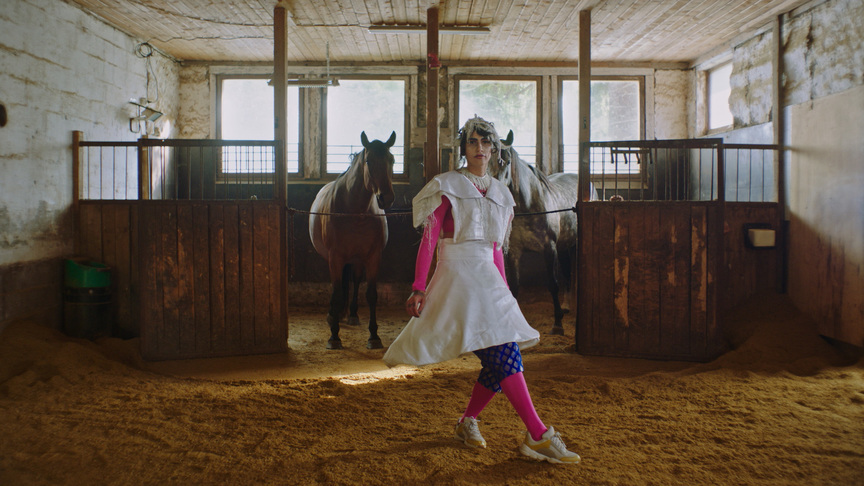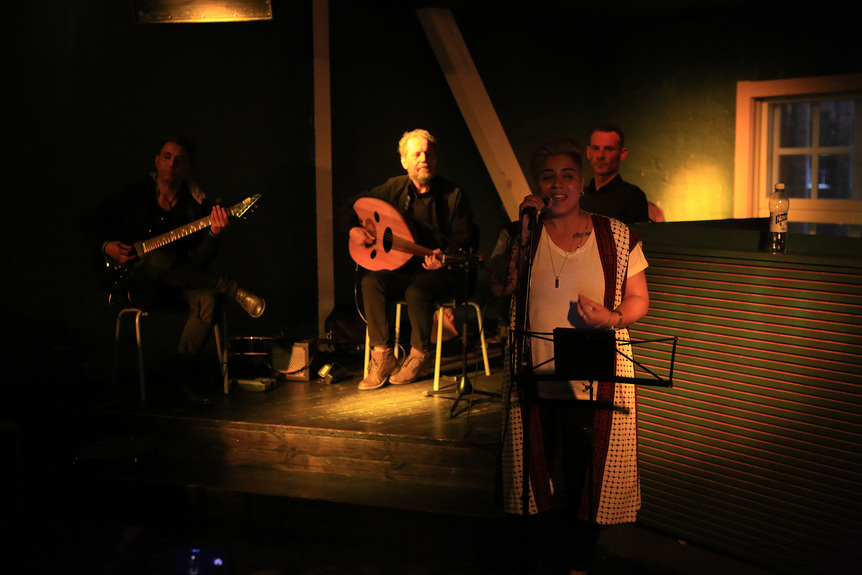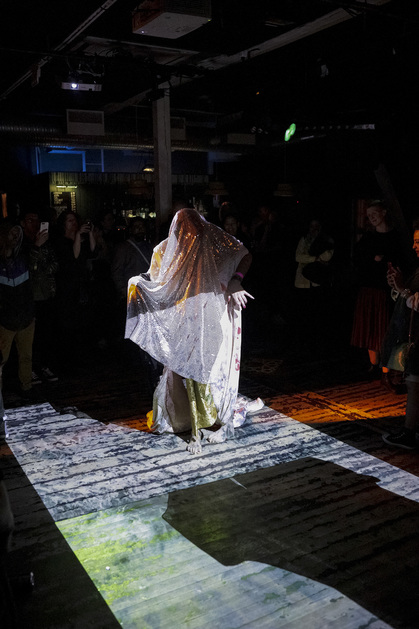
R
E
V N
E
X
T
Recap of “Mythological Migrations: The Nightclub”
View of ABDULLAH QURESHI’s “Mythological Migrations: The Nightclub,” at Kaiku, Helsinki, 2019. Photo by Aman Askarizad. All images courtesy the artist and Publics, Helsinki.
The sound of hooves and a horse’s swishing tail open Abdullah Qureshi’s film Journey to CharBagh (2019), the first work in the performance and video program “Mythological Migrations: The Nightclub,” curated by the artist, commissioned by Publics, and hosted by the Helsinki nightclub Kaiku as part of the arts festival Today Is Our Tomorrow. Music by Zān and Rakae Jamil heightened the captivating pull of the movements and gestures of the film’s characters. First the Burāq—a half-equine, half-human creature from Islamic mythology—exits a stable in Finland only to be seen in the next frame performing a Kathak dance at the Lahore Fort. The artist chose the latter location for its Charbagh gardens, a design drawn from the quadrilateral garden of Paradise in the Quran. Then two wrestlers fade into focus, pushing into each other on the muddied floor of a Lahore wrestling ring. In the third sequence, a trans woman, make-up glistening under disco lights, pauses on the verge of song. Qureshi’s figures enter and exit the frame, seemingly unrestricted by, for example, the migratory control system protocols mentioned in the film’s initial voiceover, which offers a poetic meditation on the notion of passing, both as another identity and across borders. Flight is foregrounded with all its complex and contradictory associations: heavenly ascension, escape, exit, exile. For Qureshi, Islamic mythology brims with queered times and spaces; bringing it into a nightclub was conceived as a disruption to historically exclusionary European club culture by the artist and his three collaborators, who all self-identify as queer, Arab, and Muslim.
After Meera Band’s 30-minute set featuring singer Mira Shatat’s mesmeric renditions of 20th century Arabic classics by the likes of Fairuz and Dalida, the screening of Tamara Al-Mashouk’s video Where Are You From (2019) continued the evening’s collective construction of an inclusive, anti-exoticizing frame through which to view Arab bodies. The three-minute short shows a series of make-up artists and hairstylists busying around the artist, as she recites in voiceover a lyrical text addressed to an unnamed aggressor, a “you” that shifts between an ex-lover, the Western gaze, and the persecutors of her Palestinian great-grandmother. The video’s elegant switching of perspective and film format combined with a direct questioning of the viewer (“Who are you? Do you even know?”) subvert any reductive impulse toward superficial, monolithic interpretation. Dominance is muddled: at one point, a stylist pulls the artist’s hair, while at other moments Al-Mashouk, in a black leather outfit recalling BDSM aesthetics, clearly gives the orders. The relations of power that bear on the body within society are scaled down and re-inscribed by the artist and her staff, who transfigure control and silence into pleasure and voice.
A performance by Faluda Islam, the zombie-drag-queen alter ego of Zulfikar Ali Bhutto, Jr., closed the program. Over video footage from the Lebanese Civil War and of contemporary drone attacks in Pakistan and Yemen, the zombie queen began to speak, or tried to, as she sputtered and gagged, setting up a productive tension between speech, media excess, and silence that lasted the duration of the piece. Although Faluda could not speak, she lip-synced very well: first an audio recording of teenage militant Sana’a Mehaidli, and later a pre-recorded video of the artist himself reading a manifesto against death and war. The sequined-cloth-covered table behind which the artist speaks in the video was present in the club, behind the zombie queen. The performance ended with a playback of The Cranberries’ 1990s hit “Zombie.” Such playful interactions between Bhutto’s body and voice, and the work’s audio-visual reproductions felt supernatural in the performance, and yet reflect our digitally mediated daily lives. The artist’s compelling investigation of how technologies of war intersect with sexuality and subjectivity brings a vital queer, Muslim perspective to the study of global “necropolitics,” a concept coined by philosopher Achille Mbembe that refers to the ways in which social and political power determine the susceptibility of certain groups to death, and which greatly informed Bhutto’s performance.
Through diverse forms of direct address across song, poetry, film, and performance, “Mythological Migrations” demonstrated that the meeting of queerness and Islam, as the 14th century Persian poet Hafiz said of “men and men who are lovers, and women and women who give each other Light,” is “happening all the time.”
Today Is Our Tomorrow, organized by Publics, ran from September 12 to 14, 2019.
To read more of ArtAsiaPacific’s articles, visit our Digital Library.



















